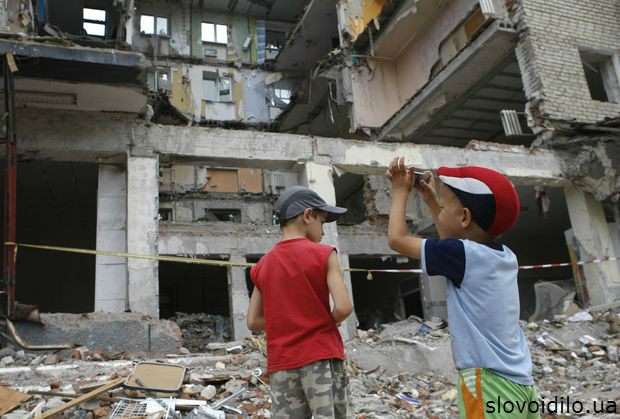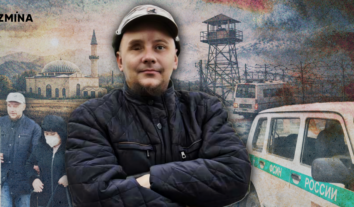A child and the war: How to cope with consequences of armed conflict
#FeelYourRights
“My mother and I realized that it was useless to flee to the basement when the shelling had started. We just lay in a bath and prayed, “Lord, save us.” This family lived on the fifth floor. They were afraid of going to the basement as the basements had not been designed to resist bombing and they were cases when people simply could not get out because of debris.” It’s the story of a 15-year-old girl.
The Social Policy Ministry of Ukraine has already registered over 160,000 internally displaced children.
Liubov Loriashvili, psychologist from the Kyiv center of social services for family, children and youth, tells how to help your child recover from loss and cope with the consequences of war.
What you should expect of a child, who has survived war
It’s difficult for the children, cut off from their families during the armed conflict, to cope with its consequences.
The experience of loss of a loved one, separation, or move may form a whole palette of signs of risky behavior of a child.
They may be expressed in crying, screaming, hysterics, thefts, apathy, rebellion, runaway, lies, fantasies, and even autism.
Liubov Loriashvili warns that if a child has medical depression, you should urgently address the expert.
“The timely medicinal assistance can help a child. In addition, depression is hereditary. If it was in the family, it is quite possible that a child has a predisposition,” she says.
It’s important to explain the children that they are not guilty and they could not prevent the war.
If children experience a tragic loss, they get angry. After all, they asked God and God did not help, they talked to people, and they did not help. In such a case, people get angry with themselves and others. Then, the anger escalates either into aggression or depression.
During the depression, children do not care what happens to their life up to the fact that they do harm to themselves. They may cut themselves, have suicidal feelings. They also may take psychoactive substances to get away from this life.
The expert recommends helping children show the irrationality of their guilt. You should make it clear that children could not prevent war.
Liubov Loriashvili says that it’s easier to work with the children’s aggression as it is visible and you can see its reasons. However, you cannot say the same thing about the suicidal thoughts which cannot be heard.
You need to help children understand why they are here, why it has happened that they are no longer with their parents and have experienced some losses and move.
Tell the truth
Liubov Loriashvili recalls that once the teenagers, taken from Shchastia and Luhansk to the center “Our Children”, heard the news that the fighting had abated, they immediately found the center’s director and demanded to send them home.
Listen to them, do not ignore their desire to conduct “negotiations”, but try to explain that here they are safe, tell them truth, do not deceive them. Children always feel it.
Do not stick labels, talk about the uniqueness of a child
It’s of a crucial importance for the internally displaced children not to hear such labels as “separatists”, “Donbas residents”, “these people from Donetsk” and so on.
Children should manage their emotions, and you should give them a sense of stability, safety, and the ability to do something.
When any loss happens in a children’s life, they may experience physiological and also emotional shocks. Some children may experience emotional shock for up to a year. Children may seem to be stiffened. They refuse to believe in what is happening or has happened.
Listen to a child
Seeing a deviation in behavior, you should ask yourself, “Why does a child behave so? What does he/she lack? What does he/she want?“
It is very important to return the internally displaced children to stable life. If they went to music classes in their hometown at 2 p.m. every Tuesday, it would be great if they have the same opportunity at the same time in their new place of residence. If the children went to bed on the same time, make sure to return this time.
The practicing psychologist from the Kyiv center of social services for family, children and youth recommends talking with children about difficult episodes of their life as it helps to overcome the trauma.
Therapeutic program

To prevent the risky behavior, Liubov Loriashvili recommends holding psychotherapy groups of the displaced children, using the techniques of Professor William Yule (UK) and Doctor Elin Hordvik (Norway). The program has been tested on 8,000 children who had gone through different military conflicts. The program is aimed at addressing the post-traumatic symptoms, experienced by children who saw the horrors of war.
The children, who survived the traumatic events, re-experience them. They dream nightmares in which the situation is repeated or is further developed. Children become overexcited. Their anxiety grows, and insomnia appears.
“They are easily frightened. For example, I have never thought that the sounds of the Kyiv subway look like Grad shells. Children get scared in the subway,” Liubov Loriashvili says and advises the adults to avoid things that may remind children about the trauma.
For example, to bypass the servicemen or men in military uniform, big trucks.
The objective of this program is to show children that the things they are experiencing are a normal reaction to stress, that they are not going mad. The program aims to form the skills to manage bad memories which may pop up at any time.
Liubov Loriashvili advises holding the groups together with the parents because they also lack such skills.
The program is designed for the groups of 10-15 people of about the same level of development, for example, 8-9, 9-10 years old as every age have different perceptions of death.
The meeting should take place once a week. It is recommended to hold six sessions of 60 – 80 minutes.
Do not forget about the basic needs of children – safety and stability. You should make breaks in the sessions to give children time to have a tea, eat cookies, or, better, fruit. When the kids remember what happened to them, blood sugar may fall sharply. The program provides for much activity, and glucose helps the brain activity.
The group therapy should be carried out in a bright, spacious room. The dark, poorly ventilated rooms depress children as many stayed in basements, shelters. Children need to see the space, the light, to be able to sit, to lie, to paint. Many of the exercises require a lot of space, especially those for relaxation.
You can allow children to have fun, even if the program does not suggest this. If there is a reason for laugh, let the children laugh and relax.
The article was published following the International Scientific and Practical Conference “Effective Approaches to Work with Teenagers who have Experience of Use of Psychoactive Substances”.














